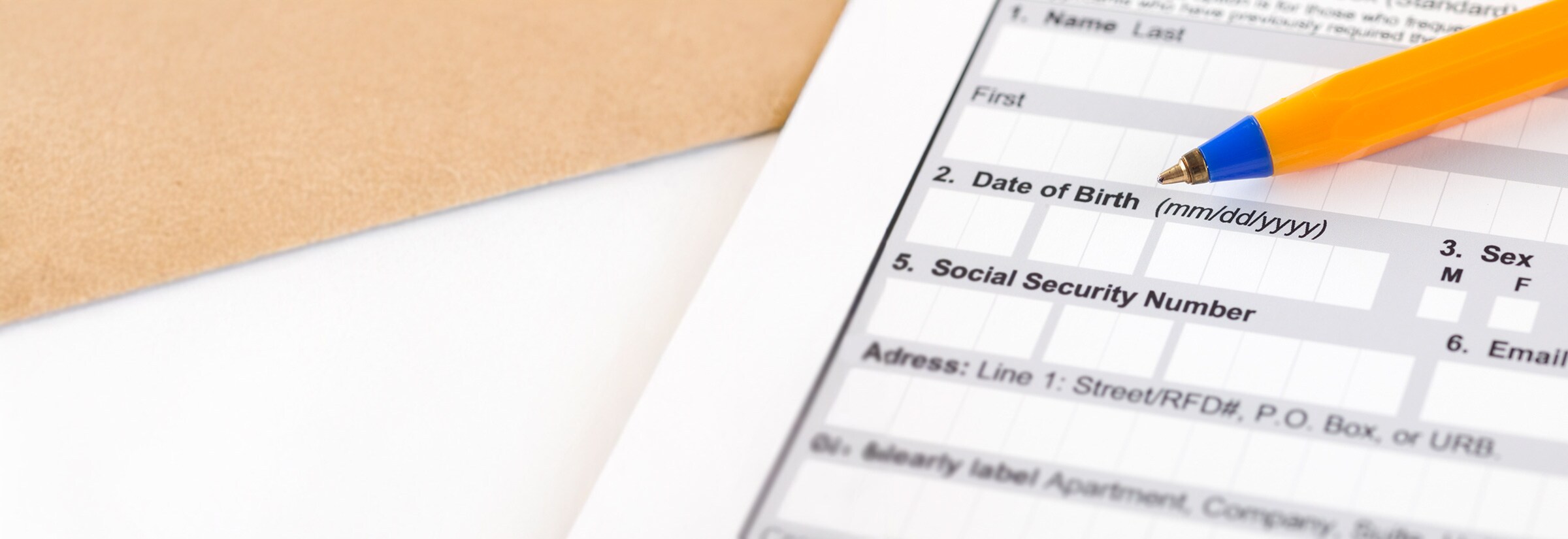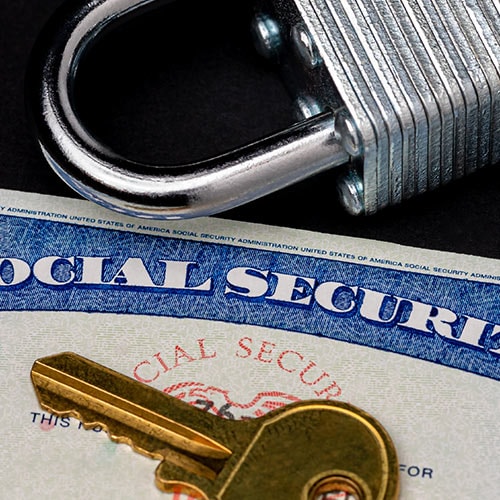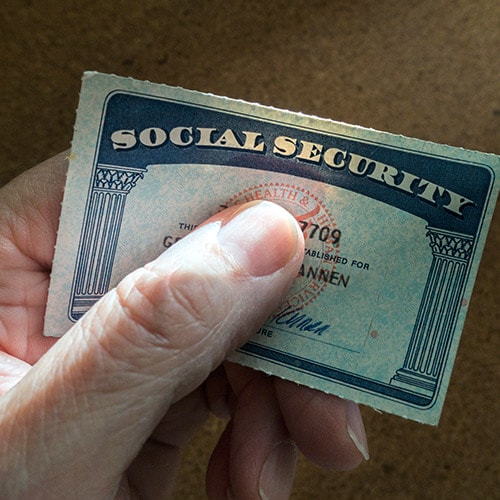Most Americans are assigned a Social Security number (SSN) at birth. Eligible residents or immigrants get one when they start working or need to claim benefits. Your SSN grants access to government services, helps the government track your earnings, and is sometimes used to verify your identity.
Typically, your SSN stays with you for life, and most people have no reason to want to change it. However, if you experience identity theft, administrative errors, or risks to your personal safety, you may be allowed to get a new one.
Here’s everything you need to know about when you can change your SSN, how to do it, and what other measures you can take to protect your identity.
Valid reasons to change your Social Security number
The Social Security Administration (SSA) provides a list of valid reasons to change an SSN, including identity theft, risk of harassment or endangerment, cultural objections, and administrative issues like sequential or duplicated numbers.
The SSA reviews each request to change an SSN individually. If approved, a new number can help protect your personal information from further misuse or ongoing threats.
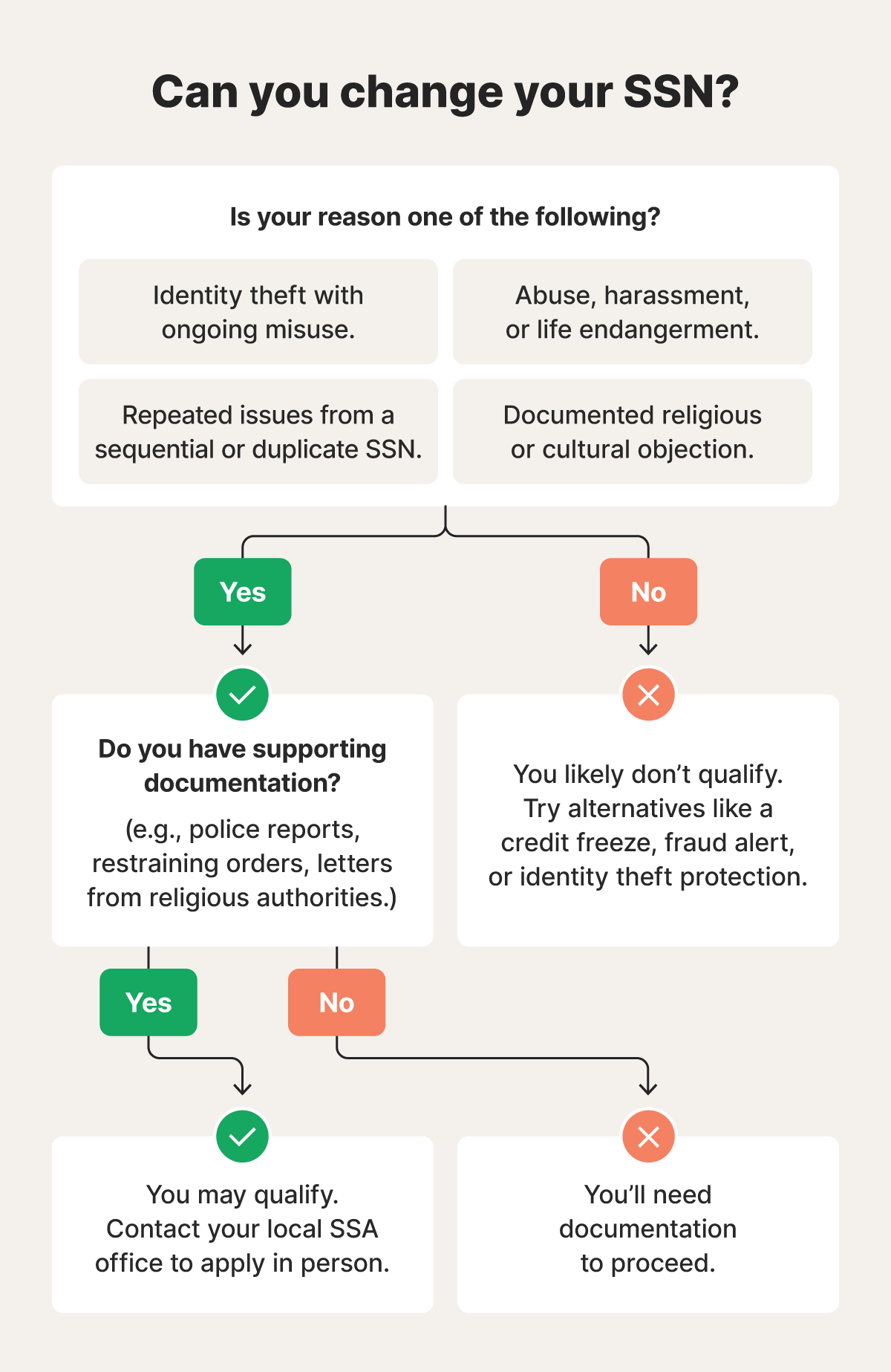

Here’s a closer look at some reasons that could allow you to change your SSN.
Identity theft
Over 1.1 million identity theft reports were made to the Federal Trade Commission in 2024, making it one of the most common types of fraud. Identity theft happens when someone uses your personal information, like your SSN, to commit fraud, open new financial accounts, or access services in your name.
For some victims, ongoing fraud linked to identity theft can lead to serious consequences, like financial hardship, loss of government benefits, and even criminal charges. In these cases, requesting a new SSN can effectively prevent further misuse of the old one.
However, being a victim of identity theft doesn’t guarantee you’ll be approved for a new SSN. Even if you report identity theft and provide evidence that you’ve made attempts to resolve the issue, the SSA also generally requires proof that the theft of your SSN has caused significant, ongoing harm.
One Reddit user, for example, said that even after two and a half years of constant fraudulent loan applications, police reports, and denied credit attempts, their request for a new SSN was denied.
If you’re concerned about the risk of identity theft but can’t change your SSN, LifeLock can help. Social Security and credit monitoring features alert you to suspicious activity involving your identity, so you can take action to stop fraudsters in their tracks. And, if you do ever fall victim to identity theft, you’ll qualify for up to $1 million in reimbursement.
Life endangerment
Victims of abuse, stalking, or domestic violence may qualify for a new SSN to protect their safety. The SSA’s official guidance notes that if you’re in a life-threatening situation, such as escaping an abuser or frequent harassment, a new SSN can help you rebuild your identity and reduce the risk of being found by someone with harmful intent.
Since a policy update in 2021, the SSA now accepts third-party evidence, such as police reports, restraining orders, medical records, and letters from shelters or eligible advocates to verify the threat and approve a new number.
If you’re in danger or attempting to escape an abusive situation, call the National Domestic Violence Hotline at 1‑800‑799‑SAFE (7233) or visit TheHotline.org to explore options, including help with securing your SSN and a full Identity Protection Plan.
Sequential numbers
Before 2011, the SSA issued Social Security numbers using a predictable system based on geography and application date. This meant people born in the same state around the same time could end up with sequential SSNs, like 123-45-6788 and 123-45-6789.
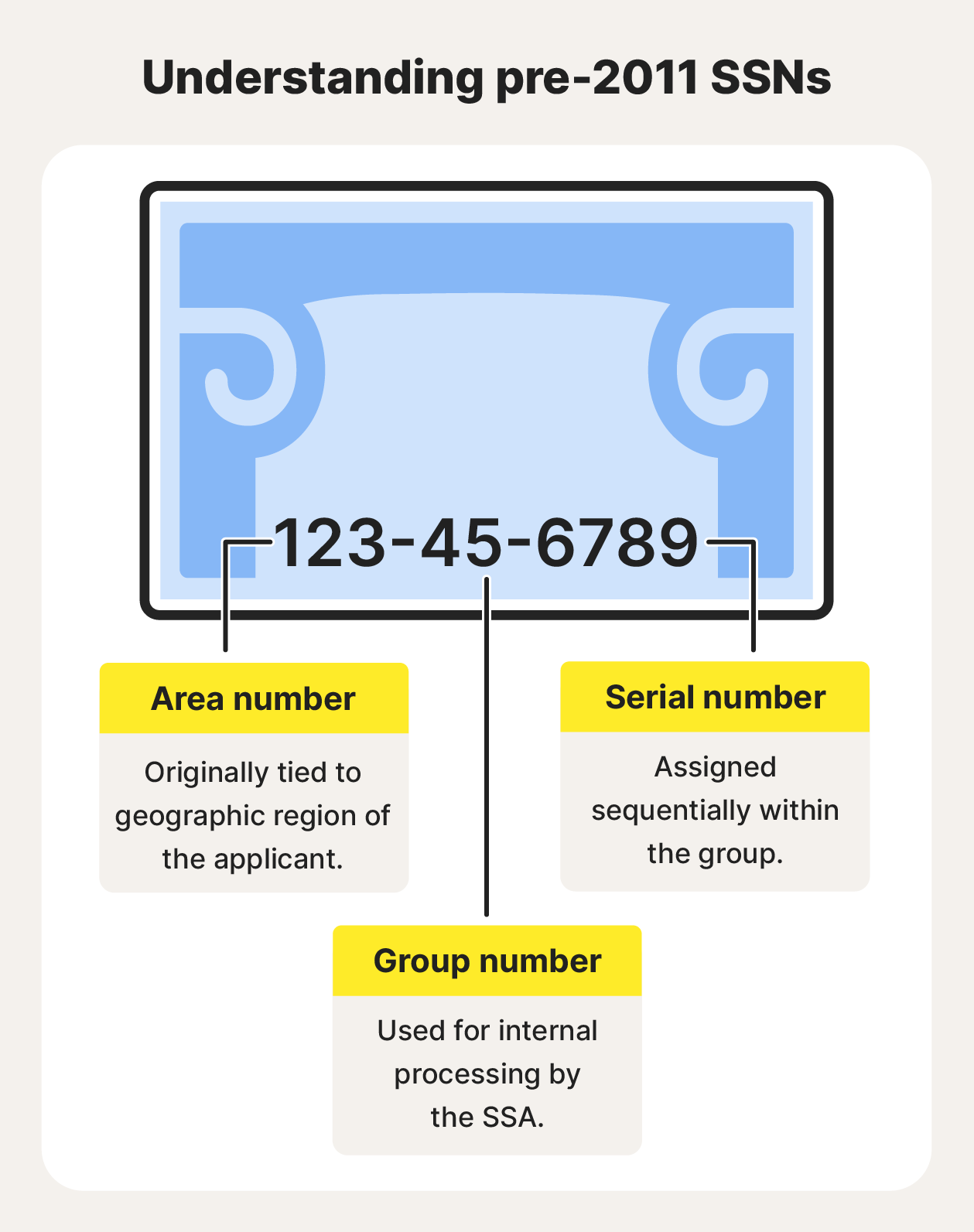

While these SSNs aren’t necessarily easier to guess outright, they may offer identity thieves a starting point. If someone knows where you were born and approximately when, they could deduce the first three digits of your SSN and get clues towards figuring out the last four digits. That makes older numbers generated before the switch to randomization in 2011 slightly more vulnerable to targeted fraud.
The most likely cause of sequential numbers is a family applying for multiple SSNs at once, which could lead to siblings having nearly identical numbers.
Issues with sequential SSNs often only come to light only after repeated incidents of identity theft or unusual patterns in credit reports.
If you have an SSN that has consistently been targeted or seems to be putting your identity at ongoing risk, the SSA may approve a number change after assessing your case.
Multiple people assigned the same number
If the SSA mistakenly issues the same number to more than one person, it can cause financial and legal issues. Shared SSNs lead to mixed-up credit histories, medical records, and tax filings, making it difficult for individuals to prove their identity or qualify for loans and services.
In one example, two women, both named Jieun Kim and born on the same day in South Korea, received the same SSN after immigrating to the U.S. Since then, they’ve faced blocked bank accounts, frozen credit cards, and wrongful suspicion of identity theft.
Most people only discover a shared SSN after spotting suspicious credit activity, receiving notices about unfamiliar accounts, or being denied services they’re otherwise eligible for.
If you experience repeated issues with your SSN despite having resolved any known fraud, it may be worth asking the SSA to investigate whether your number is shared with someone else. If it is, you should be approved for a change of SSN.
Religious or cultural objections
Some people may request a new Social Security number due to strong religious or cultural beliefs tied to specific numbers. While the SSA doesn’t accept personal preference or superstition as valid reasons, it may consider requests supported by established religious doctrine.
For instance, some religious groups view the number “666” as a symbol of evil and may object to having it appear in their SSN.
To qualify, applicants must provide documentation from a recognized religious authority explaining the belief and its significance. Although cases are rare, the SSA may approve a new number if the objection reflects a documented, longstanding religious or cultural belief.
When you can’t change your Social Security number
Not every issue involving your SSN qualifies you for a new number. In most cases, the SSA expects you to take preventive steps to protect your information rather than request a replacement.
The following situations are examples of when you can’t change your SSN, even if it puts your identity at risk.
- Your card was lost or stolen: If your SSN is lost or stolen but your number has not yet been misused, you can request a replacement card, but not a new number.
- You’re the victim of a data breach: Your SSN being compromised in a data breach doesn’t qualify you for a replacement, unless your SSN has been actively misused as a result. Even then, your request may only be accepted if you’re experiencing significant ongoing harm.
- You’re trying to avoid debts: You can’t get a new SSN to sidestep debt, poor credit, or other financial obligations tied to your current number.
- You find your SSN on the dark web: The SSA doesn’t consider your SSN appearing on the dark web as a valid reason for issuing a new number, despite the fact it leaves you vulnerable to fraud. However, if you experience significant identity theft as a result, an SSN change request might be approved.
How to get a new Social Security number
If you qualify for a new SSN due to identity theft, harassment, or another valid reason, you’ll need to follow the SSA’s formal application process. Here’s what that typically involves:
- Contact your local Social Security office: Find your local SSA office using the Field Office Locator and call the number provided or schedule an in-person appointment. The process of getting a new SSN can’t be completed entirely online.
- Complete Form SS-5: After speaking to an SSA representative, you’ll be pointed towards the application form for a Social Security card (called the SS-5). This is available on the SSA website or at your local office.
- Gather supporting documents: To support your application, you’ll need original or certified copies of key documents, including proof of identity (like a driver’s license or passport), proof of U.S. citizenship or immigration status, and evidence of your reason for the request (such as police reports or restraining orders).
- Submit everything in person: Attend your scheduled appointment and bring your completed form and all required documents. While in-person visits are typically required, the SSA may allow you to submit your application by mail in some instances, such as if you live in a remote area, have limited mobility, or are specifically instructed to do so by an SSA representative.
- Wait for processing: If your request is approved, the SSA could take about two weeks to verify your information and assign you a new Social Security number.
Impact of changing your Social Security number
While changing your SSN can help resolve specific issues you’re facing, it can also cause new problems. Among the most common is confusion around your credit history — credit bureaus can have trouble linking your new number to your existing credit file, which may temporarily impact your credit score or delay loan approvals.
You’ll also need to update your new SSN with banks, government agencies, employers, and medical providers. This process is time-consuming and, if not done correctly, may lead to gaps or errors in your records.
In some cases, your old and new SSNs may remain partially linked, especially if your name and other personal details stay the same. As a result, your credit history could reflect both numbers unless you work with the credit bureaus to fully resolve the transition.
Alternatives to changing your Social Security number
If your request to change your SSN is rejected, there are some alternative steps you can take to try and resolve issues and reduce your vulnerability to identity theft:
- Placing a fraud alert notifies credit bureaus to flag your credit file, making it harder for someone to open new accounts in your name without passing an identity verification check.
- Freezing your credit is a more robust way to protect your credit file. It blocks lenders from accessing your credit report altogether, which means it’s impossible to open new accounts. However, you’ll need to manually unfreeze your credit whenever you want to apply for new credit.
- Using identity theft protection services, like LifeLock, to monitor your credit file and Social Security number means you’ll get alerts of any suspicious activity that’s detected. This can help you spot and respond to threats as they arise.
- Locking your SSN through the SSA’s SSN Lock tool helps prevent others from using your number in E-Verify, the system employers use to confirm work eligibility.
- Reporting fraud to the FTC at IdentityTheft.gov can help you recover from fraud or identity theft, with tailored guidance on what to do and official documentation that can help you prove the case to banks or credit bureaus.
Keep tabs on your SSN with LifeLock
Taking steps to safeguard your identity can reduce the chance that you fall victim to SSN fraud. That starts with simple steps, like never sharing your Social Security number with anyone who doesn’t need to see it.
For added protection, join LifeLock. You’ll get monitoring features that help you detect signs of identity theft, like a fraudster trying to open new credit accounts in your name. Be alerted to suspicious activity before it causes lasting damage.
FAQs
Can you change your Social Security number online?
No, you cannot change your Social Security number online. If you qualify, you must apply in person at your local SSA office. Online requests are not accepted for SSN changes.
How much does it cost to change your Social Security number?
Changing your SSN is free. If someone demands payment to change your Social Security number, it’s likely a scammer trying to steal money or payment information.
When you get married, does your Social Security number change?
No, your Social Security number stays the same when you get married. You only update the name on your record if you change your last name.
Can I get a new Social Security card?
Yes, you can get a new SSN card if your card is lost, stolen, or damaged. Replacing your Social Security card is free and typically requires submitting an application with proof of identity to the SSA. This process does not change your Social Security number.
Editor’s note: Our articles provide educational information. LifeLock offerings may not cover or protect against every type of crime, fraud, or threat we write about.
Start your protection,
enroll in minutes.
LifeLock is part of Gen – a global company with a family of trusted brands.
Copyright © 2026 Gen Digital Inc. All rights reserved. Gen trademarks or registered trademarks are property of Gen Digital Inc. or its affiliates. Firefox is a trademark of Mozilla Foundation. Android, Google Chrome, Google Play and the Google Play logo are trademarks of Google, LLC. Mac, iPhone, iPad, Apple and the Apple logo are trademarks of Apple Inc., registered in the U.S. and other countries. App Store is a service mark of Apple Inc. Alexa and all related logos are trademarks of Amazon.com, Inc. or its affiliates. Microsoft and the Window logo are trademarks of Microsoft Corporation in the U.S. and other countries. The Android robot is reproduced or modified from work created and shared by Google and used according to terms described in the Creative Commons 3.0 Attribution License. Other names may be trademarks of their respective owners.
